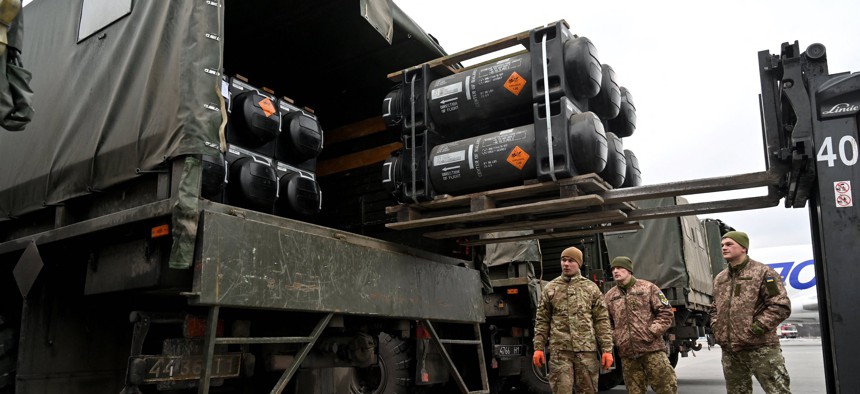
Ukrainian servicemen load a truck with the FGM-148 Javelin, American man-portable anti-tank missile provided by US to Ukraine as part of a military support, upon its delivery at Kyiv's airport Boryspil on February 11, 2022. AFP via Getty Images / SERGEI SUPINSKY
Congress’ Plan For Ukraine Aid Surpasses the White House Request by $7B
Lawmakers boosted funds for replenishing American weapons’ stocks and supporting European Command operations.
Congress unveiled a $40 billion supplemental spending bill Tuesday to help Ukraine, surpassing the $33 billion request the Biden administration sent over last month.
The House is expected to debate and vote on the bill late Tuesday night, just one day after President Joe Biden agreed to separate the funding for Ukraine from another spending package to help fight the Covid-19 pandemic. Democrats wanted to pair the two requests together, but Republicans objected and threatened to derail the foreign aid.
The extra $7 billion in Congress’ plan boosts funding for some important priorities above the president’s request, including an extra $3.3 billion to replenish Pentagon weapons stocks that have been sent to Ukraine, and an additional $1.3 billion to support operations in U.S. European Command.
Bridget Brink, the nominee to be ambassador to Ukraine who was testifying at the Senate Foreign Relations Committee as the supplemental bill was released, said it’s “incredibly important” for Congress to move the bill quickly.
“What we are trying to do as an administration is move security items as fast as possible to Ukraine, so while we have already provided some $3.8 billion of security assistance, the needs are large,” she said at her confirmation hearing. “It’s really important that we are able to continue that. I think most people assess these next few weeks and maybe longer are critical to the ultimate result of this war of choice.”
In March, Congress approved $13.6 billion in spending to help support Ukraine in the fight against Russia. The administration exhausted that money in April after announcing three $800 million military and humanitarian aid packages, and asked Congress on April 28 for another $33 billion for Ukraine. But Congress exceeded that request, and is expected to approve nearly $40 billion in emergency funding “to support the Ukrainian people and defend global democracy.”
Many lawmakers are expected to support the bill. Last month, Sen. Jim Inhofe, R-Okla., the ranking member of the Senate Armed Services Committee, said he was concerned that the Biden administration’s $33 billion request “does not fully meet the scope and scale of the challenges the armed forces of Ukraine face over the next several months.” Other leaders also stressed the need for Congress to quickly approve the bill.
“Time is of the essence—and we cannot afford to wait,” Speaker of the House Rep. Nancy Pelosi, D-Calif., said Tuesday in a letter to colleagues. “With this aid package, America sends a resounding message to the world of our unwavering determination to stand with the courageous people of Ukraine until victory is won.”
However, some complained that lawmakers were being asked to vote on spending such a large amount of money less than six hours after the 30-page bill was released.
“The text of the Ukraine supplemental JUST dropped. It’s 3:09PM. I am told it’s just under $40BB, but looking at it,” Rep. Chip Roy, R-Texas, tweeted. “Many undefined terms. No briefing. No strategy. We allegedly are voting on it tonight. This is a hard & loud ‘no.’ I support Ukraine - but I represent Americans.”
The bill includes $6 billion to send weapons and provide training to troops through the Ukraine Security Assistance Initiative, $8.7 billion to replenish American stocks of equipment and munitions sent to Kyiv, and nearly $4 billion for European Command operations for intelligence support and hardship pay for troops deployed there. The bill also includes $600 million to help the American defense industrial base ramp up missile production and $500 million to increase the Pentagon’s stockpile of munitions.
The bill also includes $13.9 billion for the State Department, including $4 billion for the Foreign Military Financing Program, $8.8 billion to support Ukraine’s economy, and $110 million to repair and harden the U.S. embassy in Kyiv.







